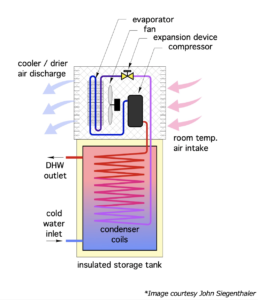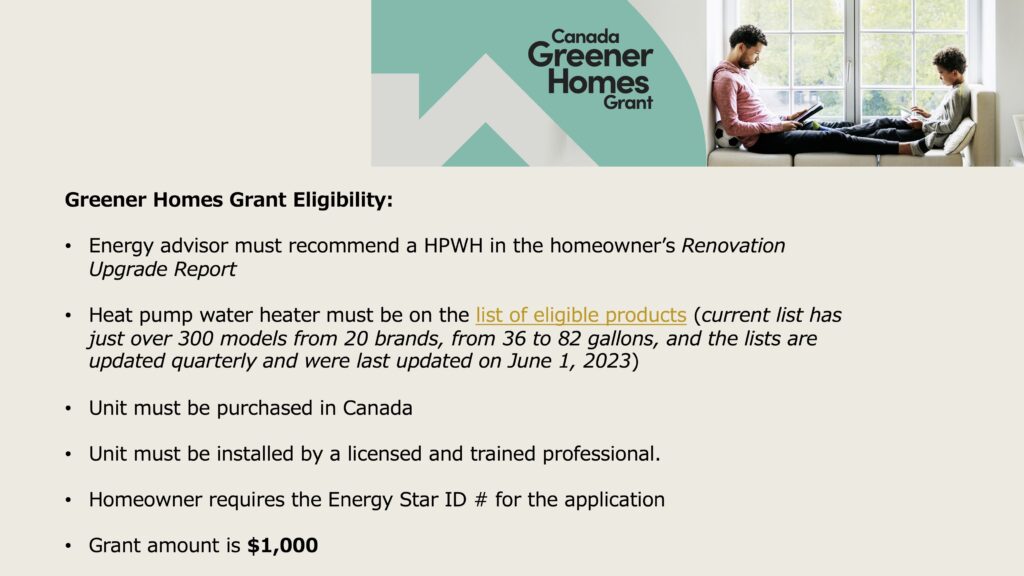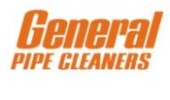
HEAT PUMP WATER HEATERS: What you need to know!
August 16, 2023 | By HPAC Magazine
Steve Goldie re-joins the 30 Mechanical Minutes webinar series to share his insights into the history and current realities of heat pump water heaters.

Heat pump technology has been a viable solution for moving heat in households for years, and just now are consumers—along with plumbing and HVAC contractors—beginning to appreciate the potential of heat pump water heater systems.
In the latest edition of 30 Mechanical Minutes (HPAC magazine’s free webinar series), we sat down with our regular plumbing writer Steve Goldie to discuss his own history with heat pump water heaters and why he really thinks their time has finally arrived. The sponsor for this edition of 30 Mechanical Minutes was Bradford White.
 In early 2019, Goldie wrote an article for HPAC entitled: Heat Pump Water Heater Potential Remains Unrealized. The article was actually a follow-up to another story he had written almost 10 years earlier where he described the many benefits of heat pump water heaters, based primarily on their energy efficiency.
In early 2019, Goldie wrote an article for HPAC entitled: Heat Pump Water Heater Potential Remains Unrealized. The article was actually a follow-up to another story he had written almost 10 years earlier where he described the many benefits of heat pump water heaters, based primarily on their energy efficiency.
In this webinar, Goldie recalls those articles and shares how he explains heat pumps to people:
“When I do training sessions and we talk about heat pumps, whether it be heat pumps for heating and cooling your home or your water, I always ask people, ‘Does anyone have a heat pump in their house?’ And then I often get blank stares.
“Then I ask, ‘How do you keep your beer cold?’ And I explain that your refrigerator is a heat pump, using the refrigeration cycle to move (or pump) heat out of the fridge.
“With a heat pump water heater, we’re doing the same thing in reverse. We’re pumping, or moving, heat that we’re extracting from the ambient air of the room and we’re using it to heat the water in the tank.”
He notes that roughly 15 years ago there were only a handful of heat pump water heater options on the market, and today there are many more. “As with other areas where the move away from fossil fuels is driving the market, now every major manufacturer has a heat pump water heater.”
 The basic design of heat pump water heaters positioned a heat pump on the top with a tank below. Goldie also explains that heat pump water heaters are often also called “hybrid” electric water heaters, because some models can switch between heat pump mode and standard electric water heater mode.
The basic design of heat pump water heaters positioned a heat pump on the top with a tank below. Goldie also explains that heat pump water heaters are often also called “hybrid” electric water heaters, because some models can switch between heat pump mode and standard electric water heater mode.
Aside from the design difference, heat pump water heaters distinguish themselves from traditional gas and electric water heaters through their improved energy efficiency, which can be illustrated through the uniform energy factor (UEF) rating given to water heating appliances. The higher the UEF rating for a device, the higher its energy efficiency will be.
As described by Goldie, on average a conventional gas or electric water heater will have a UEF rating of between 0.65 and 0.95. The UEF range for heat pump water heaters is between 2.3 and 4.
As Goldie explains, unlike with gas or straight electric heating where the energy used to heat water can approach 100% efficient, there will always be some loss. Some combustion heat from burning gas escapes through venting, or some electric resistance heat is lost in the energy transfer, but a heat pump uses electricity to drive refrigerant through a compressor and generates more heat from the ambient air providing more Btus per kW of energy used, exceeding 100% efficiency.
Contractor Concerns
Goldie then addressed a series of questions about the technology that could be a source of concern for plumbing contractors who are unfamiliar with the technology.
The first question:
Because these units use the refrigeration cycle do plumbers installing these water heaters need refrigeration experience?
“Do you need a refrigeration ticket to plug a refrigerator in your house when you buy a new fridge? No. The refrigeration cycle is all self-contained and pre-built in the factory. So as a plumber, you’re going to pipe it up as you would a conventional water heater, and you’re going to plug it in, and it’s going to run. It’s nothing to be afraid of.”
Because the units operate like a refrigerator in reverse, taking heat out of the air and pumping it into the water, the exhaust from the unit is cooled air (unlike the back of a refrigerator which lets off heat).
So as Goldie explains, in the winter months the units are ‘stealing’ some of indoor heat from the space, but in the summer, they’re providing some cooling to the space.
As for the question: How hot can these units heat up the water? “You can get as hot as any conventional water heater for the most part,” says Goldie.
He also addresses the question of noise. “I’m always careful when people ask, ‘How noisy is it?’ I never say it’s silent.
“A conventional electric water heater is pretty much silent because there are no moving parts, so compared to a conventional electric hot water tank, they are going to be noisier.
“But noise is a relative term. Go back to the refrigerator example. Is your fridge noisy? You’re going to have some mechanical noise, but they’re not particularly noisy.”
His advice: “Don’t ever tell the customer that they won’t hear it, because then they’ll hear it.”
What about maintenance for a heat pump water heater? “Well, there are more moving parts than a conventional electric water heater, and there’s not much to do in the way of service of those units—we should change the anode rod so they can last longer without rusting. Do people do that? Some do, most don’t.”
“In heat pumps you have compressors and you have fans, so more moving parts means more potential for breakdown. So yes, there’s potentially going to be a bit more service or maintenance on these.”
Upfront cost
One of the largest barriers to adoption of heat pump water heaters has been the cost. How much more do heat pump waters cost relative to standard electric or gas water heaters?
“A residential, condensing gas water heater is going to be as expensive or more expensive upfront, while your conventional gas water heater is going to be a little bit less, but not a whole lot less nowadays,” says Goldie.
He adds that a conventional electric water heater is still the least expensive choice in the marketplace, and a heat pump water heater is going to be more than double that cost upfront.
“But again, you’re going to be running at two to three times more economically. And how much do we spend to heat hot water? The average family is probably spending anywhere from $650 to $1,000 annually, depending on where you are in the country, so if I’m saving two-thirds that’s potentially 600 bucks a year, maybe 400 bucks a year. It’s not insignificant.
“So that payback still makes sense in my mind. You’re looking at maybe a three- to five-year pay back.”
That topic led the discussion towards the many local utility and government incentive programs that can lower that upfront cost for heat pump water heaters. At the national level, the Greener Homes Grant lists over 300 different models from about 20 brands that are eligible for the funding if the homeowner qualifies.

The product eligibility lists are updated quarterly with information supplied by the manufacturers. The sizes listed are in the 40- to 80-gallon range.
For this program, the unit has to be installed by a licensed and trained professional, have an Energy Star number, and the grant amount is $1,000 for a heat pump water heater.
“That makes that payback period come down a great deal right there,” says Goldie.
Potential being realized
Goldie admits he is now seeing evidence of the market for heat pump water heaters beginning to take off.
“When I wrote that article in 2019, we weren’t selling a whole lot of units, but that is turning around. We’re seeing a lot more interest, and that interest in translating into actual sales. I’m sure that’s in large part due to incentives and simply a heightened awareness and desire for this type of product.” <>
View the entire episode here:




